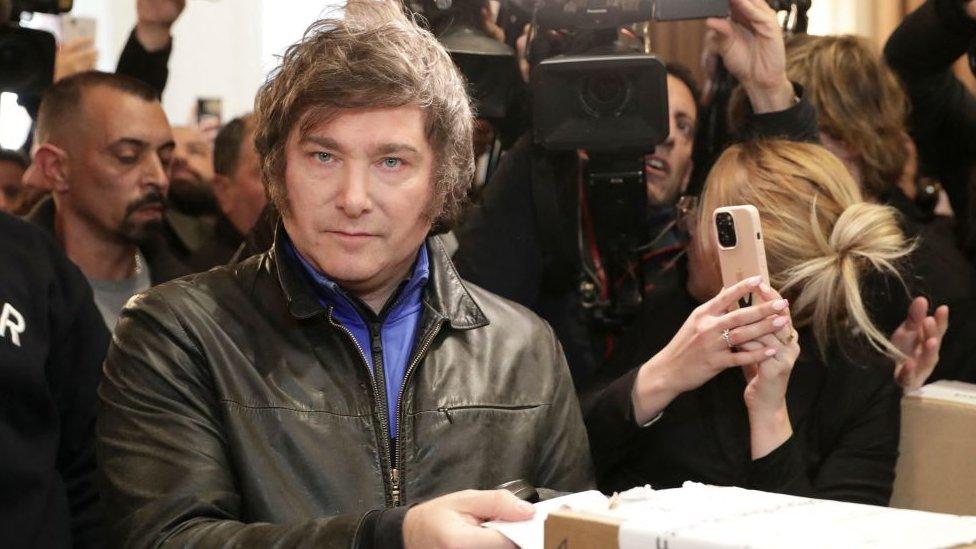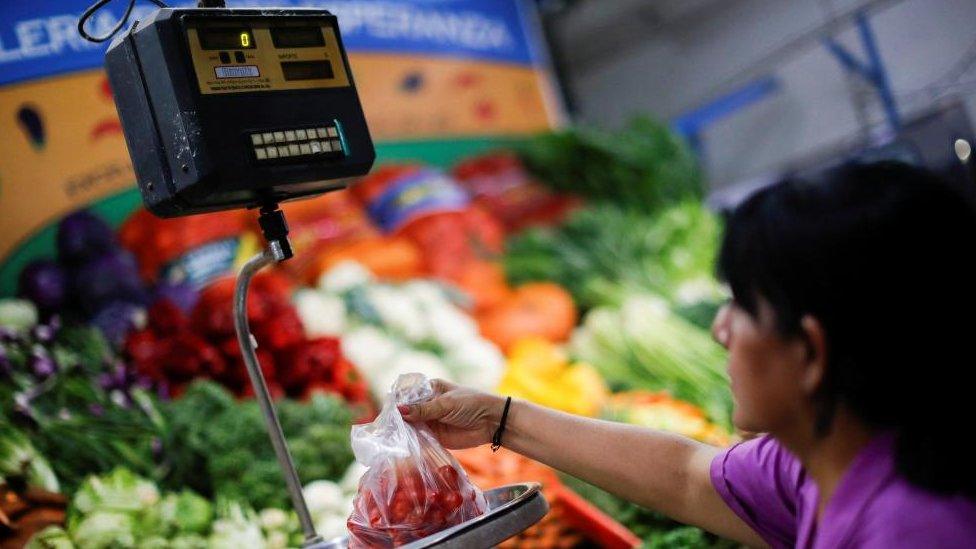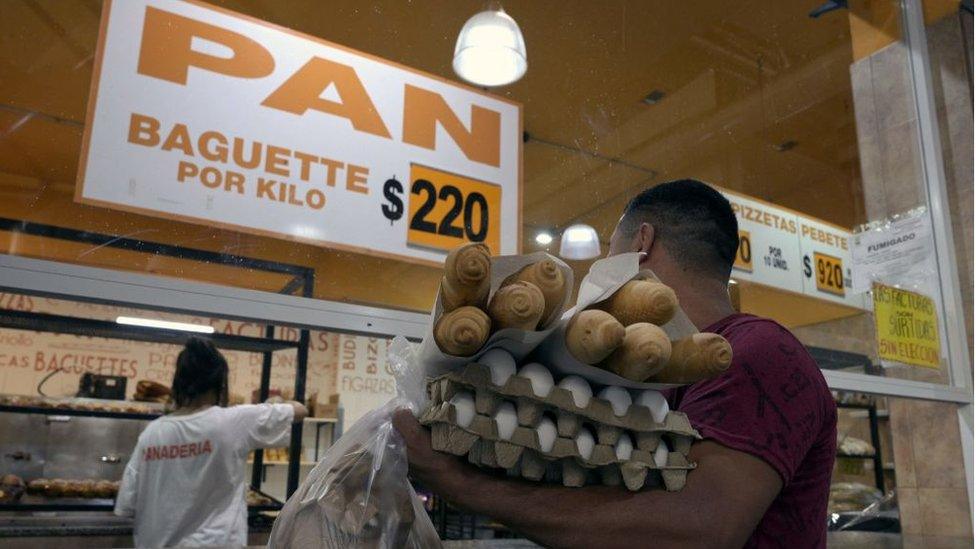Javier Milei: Trump admirer leads race for Argentina presidency
- Published

Javier Milei describes himself as an anarcho-capitalist
Far-right economist Javier Milei, who admires US ex-president Donald Trump, has received the highest share of votes in Argentina's primary election.
The primary, in which presidential candidates from all parties take part, is seen as a key indicator for the presidential election on 22 October.
Mr Milei exceeded expectations by winning 30% of votes, ahead of more established politicians.
Argentine media have described the result as a "political earthquake".
The primary in Argentina differs from those in other countries, since it is not restricted to party members, but open to all those eligible to cast their ballot in the presidential polls. Voting is also mandatory.
Whoever wins the most votes is therefore seen as a favourite for the presidential election on 22 October.
Opinion polls ahead of the primaries had seen Mr Milei trailing behind the centre-left economy minister, Sergio Massa, and conservative candidate Patricia Bullrich.
But with more than 97% of votes counted, Mr Milei had 30.06% of votes, ahead of Ms Bullrich's coalition with 28.27% and Sergio Massa's coalition with 27.24%.
Newspaper La Nación compared Mr Milei's surge to a tsunami.
Mr Milei is a former TV personality who has studied and taught economics. Despite serving as a Congressmen since 2021, he likes to portray himself as a political outsider.

Javier Milei is often seen wearing his trademark leather jacket and sporting long sideburns
His anti-establishment view have endeared him to Argentine voters angry at the current and previous governments for failing to solve Argentina's economic crisis.
Year-on-year inflation is above 115%, one in four Argentines is living in poverty and the local currency, the peso, has plummeted to such an extent that football fans from rival nations have torn up peso bills to taunt Argentine fans.
Mr Milei has launched bitter attacks on his rivals from established political parties.
Speaking after the primary on Sunday he told his cheering supporters that "we have managed to build this competitive alternative that will put an end to the parasitic, thieving, useless political caste".
The 52-year-old has said that if elected, he would abolish Argentina's central bank, replace the peso with the US dollar and privatise state-run firms which are making a loss.
In a policy that brings to mind Brazil's former far-right leader, Jair Bolsonaro, Mr Milei also proposes loosening gun controls.
Mr Milei has also stated that he is opposed to abortion unless the mother's life is at risk and has included a promise "to protect children's lives from conception" in his campaign programme.
He has attacked sex education in schools as a ploy to destroy the "traditional family" and is a climate-change denier.
Sporting long sideburns, singing rock songs and often wearing a leather jacket, the 52-year-old is deliberately provocative and often attacks "the left" in expletive-laden outbursts.
His unexpectedly good performance in the primary - 10 percentage points above what opinion polls had predicted - has sent the peso tumbling even further. The official rate fell nearly 18% when markets opened on Monday to just over 350 pesos per dollar.
Mr Milei's success was celebrated rapturously by his supporters, whom he told: "We are the true opposition, we are the only ones who want a real change, because remember, a different Argentina is impossible with the same old people, with the same old people who have always failed, with the same old people who have been failing for 100 years."
The candidates who came second and third, Patricia Bullrich and Sergio Massa, will now try to gain ground ahead of the first round of the presidential election on 22 October.
A second round pitting the top two contenders will be held on 19 November if no candidate reaches the 45% of votes - or 40% with a 10-percentage-point lead - needed to win outright.
With less than four percentage points' distance between the three top candidates in the primaries, a second round currently seems highly likely.
Argentina is not the first country in the region where an anti-establishment candidate has upset the political apple cart.
In Colombia, independent candidate Rodolfo Hernández surged ahead surprisingly in the first round of the 2022 election, but lost to a former left-wing rebel, Gustavo Petro, in the run-off.
And in Chile, a far-right candidate, José Antonio Kast, won the first round in 2021, but was defeated by the left-wing former student leader Gabriel Boric in the second round.
In Brazil, supporters of the far-right incumbent, Jair Bolsonaro, refused to accept his narrow defeat by his left-wing rival, Luiz Inácio Lula da Silva, and stormed Congress just days after the latter was sworn in on 1 January 2023.
Related topics
- Published17 May 2023

- Published15 March 2023
